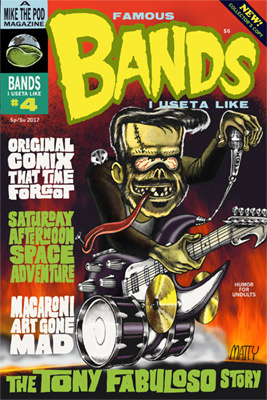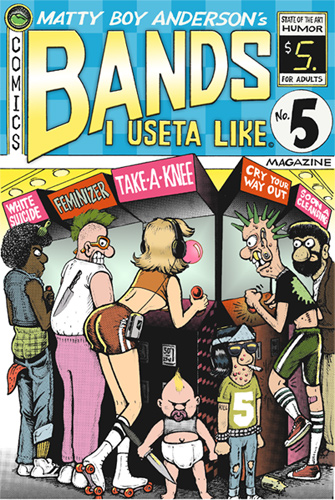Sometimes in life, we fashion an artistic animus that over time, becomes a cage that confines us. Sometimes we try different things to keep the animus from becoming stale, and redundant. Sometimes we overhear a song that makes us want to kill, kill, kill, until we are hip-deep in blood and viscera.
Hovercraft never recorded any songs like that; as I said above, Hovercraft was great. I bought Experiment Below without even hearing it, and for years I played it over and over. Nothing sounds like Hovercraft.
That’s their second studio album, from 1998, with Campbell 2000 (Ryan Campbell) on guitar, Dash 11 (Ric Peterson) on drums, and Sadie 7 (Beth Liebling) on bass. Here’s how much I adored this album; I listened to it so many times that I eventually gave it to my friend Philip, explaining that I never needed to play it again. Yes, I know I said this already. I’m reiterating for emphasis.
Take a moment to think about that. It’s why I drew the parallel in the comic strip that I did. One piece of music elicits fond memories, and invites repeated and eager listening, defying “ad nauseam”. The other piece of music incites the overpowering urge to fire up a chainsaw and rend everything up to and including its source. One piece of music is exciting, stimulating and new; the other piece is the textbook definition of banal and asinine.
Guess which one more people know about. Hell, did you even know about Hovercraft before reading this? (If so, kudos.)
I could rave about Hovercraft, and Beth Leibling’s superb bass guitar work, all day. It wouldn’t be anywhere near as funny as ranting about a goddamned Swedish pop group that sought to combine techno and Hee Haw, and who made the early ’90’s in general a living, breathing hell.
Rednex was initially the brainchild of Swedish producers Janne Ericsson, Örjan “Öban” Öberg, and Patrick Edenberg, who decided to try mixing American country and folk with modern dance and pop music. The name “Rednex” was chosen as a deliberate misspelling of the word “rednecks”. The band originally consisted of the lead singer Mary Joe (Annika Ljungberg), alongside Bobby Sue (Kent Olander), Ken Tacky (Arne Arstrand), Billy Ray (Jonas Nilsson) and Mup (Patrick Edenberg). In 1994, Rednex reworked the traditional folk song “Cotton-Eyed Joe”, retitled “Cotton Eye Joe”, as a techno track, which became an international hit single.
-from the increasingly compromised “Wikipedia“
It’s good to know that in the eyes of Sweden, “rednecks” and “hillbillies” are the same thing. Hillbilly humor, once a prevalent aspect of American culture, has been systematically redacted over the past half-century. Why? Because it’s fucking corny, that’s why. It makes anyone with the slightest bit of sophistication cringe. We don’t have state fairs with gawking buck-tooth yokels and stomping fiddlers anymore. Why do you think Gallagher grew so bitter, anyway? (I mean, excepting his other issues.)
In the interest of some sort of fairness, I present to you the worst song ever recorded. If music were medicine, this would be Stage 4 pancreatic cancer. This is musical AIDS. Full-blown.
That’s some fucking MK-ULTRA shit there. It makes you want to climb a clock tower with a high-powered rifle and begin the culling. Any world that produces something this astronomically noxious is a world that deserves to be extinguished. I know, this is Sweden we’re talking about, but Jesus wept.
Oh; it’s stuck in your head now, too? Don’t blame me, this song exists. It was a hit. The band that created it still tours. Blame society, or Sweden. Someone out there doesn’t fly into a white-hot psychotic rage at the sound of its opening notes. If that’s you, don’t tell me. I’d rather we didn’t interact. It’s for the best.
22 years ago, I created Bands I Useta Like as an exploration of the mystifying frisson of emotions engendered by musical performance. This can be positive or negative, and alarming in its intensity. In life, we are most critical of things about which we feel the most passionate. Remember passion? Singers used to have it, in general, instead of autotune, or a revoltingly breathy little-girl voice.
You want to bust my balls for whining about contemporary pop music? Fine, go for it. While you’re at it, show me one current chanteuse who can sing like this. Just one, from the past ten years. One.
I don’t care if you hate that song, or think it’s corny. It’s a magnum opus in the voice of a woman whose private life defined tragedy and heartbreak. Karen Carpenter literally worked herself to death, and get this; singing wasn’t even her first talent, it was drumming. She was brilliant.
We heard “Superstar” hundreds of times over the course of the 1970’s and 1980’s; over car radios, in doctor’s offices and elevators (as muzak), in movies and on TV. The power and passion of Karen Carpenter’s voice never lessened on repeats, or rang false. Despite her oblivious parentage, Karen had a brother with a rare understanding of her musical gifts, who labored to record and mix the absolute finest arrangements. The result was some of the most profitable music in history, that arouses genuine emotional feedback in anyone who hears it. Because I myself am a pussy, I typically get as far as the chorus before tears have to be choked back.
That’s the key; musical passion. You can hear it in Hovercraft, even at their most atonal; the band forges their own unique sonic territory, commercial appeal be damned. When music lacks passion, it comes across as mockery, an obsequious artifice designed to fool listeners into parting with their money.
When music is made without passion, it forms an aural “uncanny valley” that elicits intense revulsion in human beings. You get something that, when played, causes some people to groan as though suddenly gut-shot, and entertain violent fantasies about killing the musicians responsible, in brutal fashion.
You get “Cotton Eye Joe”.











You must be logged in to post a comment.